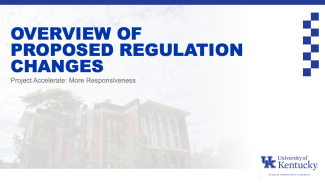Project Accelerate’s Work Group V examined 26 institutions — universities in the SEC, excluding Vanderbilt, which is a private institution; the other public universities in Kentucky and 8 institutions that, like UK, have the full range of academic and professional programs on one contiguous campus along with an academic medical center.
Some key findings:
That examination found that all other peer institutions clearly indicate that the president and/or board have final authority.
Out of the benchmarked institutions, 15, including UK, were found to have “beyond advisory” authority and 11 were found to have “largely or completely advisory authority”.
UK was the sole outlier in the depth and breadth of authority given to its University Senate.
Moreover, of the institutions referenced, Auburn University, Missouri State University and University of Alabama have only advisory authority.
And, while the University of Arkansas and the University of Wisconsin have “more than advisory” authority (similar to UK), there are also clear bounds to this authority as described below.
For more background about those institutions, read below:
Auburn University:
Article II, Section 2.02(a) of its Bylaws (pg.G-3-2), the Auburn board states: “The entire management and control over the organization, administration, activities, affairs, operations, businesses, properties and funds of the University and its constituent parts shall be completely and absolutely vested in the Board of Trustees. The Board of Trustees shall have all powers granted pursuant to Section 266 of the Constitution of Alabama and by Alabama Code Section 16-48-1 et seq., and all implied powers necessary, proper or convenient for the accomplishment of the mission of the University and the responsibilities of the Board of Trustees including, without limitation, the unfettered right to request and inspect all University financial, property, academic, personnel, and other administrative records and materials, in each case subject to such bylaws, policies and procedures as the Board of Trustees may adopt in order to fulfill its obligations, of which these Bylaws form a constituent part (collectively, the ’Policies and Procedures’).”
Missouri State University:
Article III of the Faculty Constitution constrains the power of the Faculty Senate as follows: “The Faculty Senate shall have the power to establish policy in the areas of authority assigned to the faculty in the Bylaws of the Board of Governors and for such other areas or problems as may be assigned to it by the president of the university or the Board of Governors. Shared governance, as delegated by the Board in the Faculty Handbook, recognizes the essential interdependence of governing boards, administration, faculty, staff, and students. This shared governance is indispensable to the development of educated persons. The Faculty Senate shall have the power to establish specific functional bodies to carry out powers granted to the Faculty Senate. The Faculty Senate and its established bodies shall have the power to initiate action in such curricular and non-curricular matters as it deems fit, or in such matters as are brought to its attention by one or more members of the faculty. Faculty Senate Actions, as perfected and passed by the Faculty Senate, represent the collective reasoning of the faculty through its governance process as to policies and procedures to be followed by the University. Every Faculty Senate Action is subject to challenge by the faculty and subject to final approval by the president and, when necessary, by the Board of Governors.”
University of Alabama:
The Alabama Faculty Handbook begins with a required prefatory statement: “In the event of a conflict, current statements of Board policy contained in the Bylaws, Rules, official minutes, and other pronouncements of the Board or Chancellor, or superseding law, shall prevail.”
In addition, the advisory role of the faculty is reaffirmed in Chapter 1, Section IV. Faculty Participation” which states: “The advice of faculty members concerning administrative leadership and academic programs is sought actively and systematically. Faculty and administrators are partners in the enterprise of education at The University of Alabama. Processes guiding all important decisions that shape the University's educational potential and that allocate its resources are the joint responsibility of faculty and administrators.”
University of Arkansas:
Board Policy 100.4, Chapter III, Section 5.1: “Scope and Purpose The constituency of each principal campus shall develop a system of campus government to establish policies and procedures for campus governance. The purposes shall be to provide a system that permits a broad base for governance of that campus through appropriate participating involvement of the administration, students, faculty, and staff in the determination of guidelines and policies for campus affairs and to generate and promote understanding, collaboration and a sense of community on the campus. The responsibility and authority hereinafter described in this section shall be vested in the campus organization by the University of Arkansas Board of Trustees and shall be subject to review by the Board.”
Section 5.2: “Authority and Responsibility The campus governance organization on each campus shall, under the Board of Trustees, be the legislative body responsible for developing educational policies and programs on that campus. Among other matters, this responsibility includes such areas as: (1) Admissions requirements (2) Curriculum and courses (3) Degrees and requirements for degrees (4) Calendar and schedules (5) Academic honors (6) Student affairs (7) Interpretation of its own legislation. The campus government shall have the authority to make recommendations to the Chancellor, President, and the Board of Trustees on any matter of general faculty or campuswide concern, including such matters as appointment, promotion, tenure, dismissal, and non-reappointment. Through the Chancellor, action on any matter under this paragraph is reported to the President and, when requested by the campus government or considered necessary or desirable by the President, through the President to the Board of Trustees.”
University of Wisconsin:
Wisconsin Statutes 36.09(1)(c): “The board shall determine the educational programs to be offered in the system and may discontinue educational programs as it deems necessary.”
Wisconsin Statutes 36.09(4): “The faculty of each institution, subject to the responsibilities and powers of the board, the president, and the chancellor of such institution, shall have the primary responsibility for advising the chancellor regarding academic and educational activities and faculty personnel matters.”
Faculty Policies and Procedures: 1.20. Authority and Responsibilities of the Faculty: “The faculty is vested with responsibility for the immediate governance of the university, subject to the responsibilities and powers of the chancellor and under other provisions of 36.09, Wisconsin Statutes, and shall actively participate in university policy development. As such, the faculty has primary responsibility for academic and educational activities and for faculty personnel matters.”
“In cases where authority to act without subsequent review has been delegated by the Board of Regents to the faculty, that authority is exercised in accordance with these rules. In cases where the function of the faculty is to formulate recommendations to the chancellor or the Board of Regents, the authority referred to herein is for the formulation of such recommendations.”

